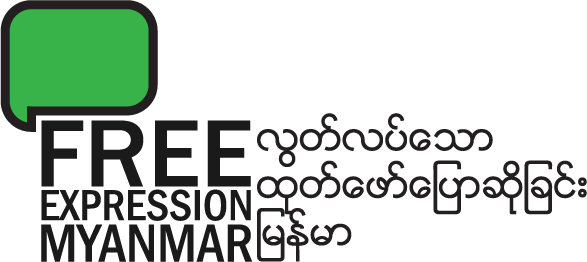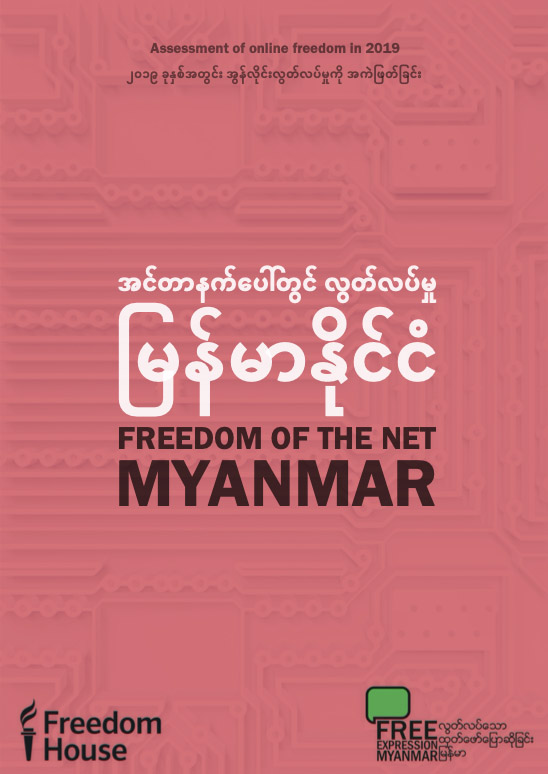One Month of 2G shows shutdown continues and undermines Covid-19 crisis response — တစ်လကြာမြင့်ခဲ့ပြီဖြစ်သော 2G ဝန်ဆောင်မှုသည် အင်တာနက်ဖြတ်တောက်မှုများ တည်ရှိနေဆဲ ဖြစ်ကြောင်း ဖော်ပြနေခြင်းဖြစ်ကာ ယင်းသည် ကိုဗစ်-၁၉ တုံ့ပြန်ချက်များအား ထိခိုက်စေသည်
နှေးကွေးပြီး လုံခြုံမှုမရှိသော 2G ကွန်ရက် ချိတ်ဆက်မှုသည် အမှန်တကယ်လိုအပ်သော ချိတ်ဆက်မှုများ အား 3G (သို့) 4G တို့ကဲ့သို့ မပံ့ပိုးပေးနိုင်သောကြောင့် ရခိုင်နှင့်ချင်းပြည်နယ်တို့တွင် အလွန်ဆိုးရွားသော အင်တာနက်ပိတ်ဆို့မှုများ ဆက်လက်တည် ရှိနေဆဲဖြစ်သည်။ ထို့ကြောင့် မြန်မာအစိုးရအနေဖြင့် 3G နှင့် 4G ကွန်ရက်များအား ပြန်လည်ဖွင့်ပေးပြီး ကွန်ရက်နှောင့်ယှက်မှုလုပ်ဆောင်ခြင်းများမှ ရှောင်ကြဉ်ပေးပါရန် ကျွန်ုပ်တို့က တောင်းဆိုလိုက်ပါသည်။
မှတ်တမ်းများအရ မြန်မာနိုင်ငံ၏ အင်တာနက်ဖြတ်တောက်မှုသည် ကမ္ဘာ့အကြာရှည်ဆုံးသော ဖြတ်တောက်မှု တစ်ခုဖြစ်လာကာ ယခုအခါတွင်လည်း 2G ဖြင့် ကွန်ရက်ပိတ်ဆို့မှုများ ရှိနေသေးသည်။ 2G တွင် အများ ပြည်သူဝန်ဆောင်မှုများ၊ ဆန္ဒမဲသတင်းများ (သို့) နိုင်ငံရေးပါတီများ၏မဲဆွယ်မှုများကဲ့သို့သော ဝန်ဆောင်မှု များအား ရရှိအောင်လုပ်ဆောင်ပေးနိုင်သော နည်းပညာစွမ်းဆောင်ရည်မရှိပါ။ အင်တာနက်ဖြတ်တောက်ခြင်း သည် ယင်းမြို့နယ် (၈) မြို့နယ်အတွင်းရှိ မဲဆန္ဒရှင်များနှင့် မကြာမီတွင် ကျင်းပမည့် ရွေးကောက်ပွဲတွင် ဝင်ရောက်ရှင်ပြိုင်မည့် ကိုယ်စားလှယ်လောင်းများအပေါ်တွင် သက်ရောက်မှုများရှိကာ တရားမျှတ၍ ပွင့်လင်း မြင်သာမှုရှိသော ရွေးကောက်ပွဲဆောင်ရွက်မှုဖြစ်ပေါ်စေရေးအား ထိခိုက်စေပါသည်။
အင်တာနက်ချိတ်ဆက်မှုသည် သတင်းများအားရရှိရန်နှင့် သတင်းမှန်ကန်မှုအား စစ်ဆေးရန် အရေးပါသော အခန်းကဏ္ဍတွင် ပါဝင်နေပါသည်။ အင်တာနက်သည် ပြည်သူလူထုအား နိုင်ငံ၏အရေးကိစ္စရပ်များ၊ ရွေးကောက်ပွဲဆောင်ရွက်မှုများနှင့် စဉ်ဆက်မပြတ်ထိတွေ့နေနိုင်ရန် ကူညီပေးပါသည်။ အင်တာနက်အား ထိရောက်စွာသုံးစွဲမှုမပြုနိုင်ခြင်းသည် အွန်လိုင်းပေါ်တွင် လွတ်လပ်စွာထုတ်ဖော်ပြောဆိုနိုင်ခွင့်၊ ပုဂ္ဂိုလ်ဆိုင်ရာ လွတ်လပ်ခွင့်၊ ချိတ်ဆက်ဖွဲ့ စည်းနိုင်ခွင့်နှင့် စုဝေးနိုင်ခွင့်တို့အား ကန့်သတ်ထားခြင်းကို ဖြစ်ပေါ်စေပါသည်။ လူမှုကွန်ရက်နှင့် သတင်းဝက်ဘ်ဆိုဒ်များအား နည်းပညာအရကန့်သတ်ထားရှိသောကြောင့် အင်တာနက်ဖြတ် တောက်မှုသည် လူထုအား ဒီဂျစ်တယ်လစ်ဟာမှုများကို ကြုံတွေ့စေပါသည်။ ထိုသို့လုပ်ဆောင်ခြင်းသည် လူ့အခွင့်အရေးနှင့် အချိုးကျမှုမရှိဘဲ သွေဖယ်လျက်ရှိပါသည်။
မြန်မာ့လူ့အဖွဲ့အစည်း၏ ဒီဂျစ်တယ်ဝန်ဆောင်မှုများအပေါ်တွင် မှီခိုမှုသည် ပိုမိုများပြားလာပါသည်။ ယခု ဖြစ်ပေါ်လျက်ရှိသော ကိုဗစ်-၁၉ထိန်းချုပ်မှုများကြောင့် လူများနှင့် စီးပွားရေးလုပ်ငန်းများသည် ဆက်သွယ် ကြရန်၊ အရေးကြီးသော သတင်းများအား ရယူကြရန်နှင့် စီးပွားရေးလုပ်ကိုင်ကြရန်အတွက် အွန်လိုင်းပေါ်တွင် မည်မျှအထိမှီခိုနေကြသည်ကို ကျွန်ုတို့အနေဖြင့် မြင်တွေ့ရပါသည်။ အင်တာနက်ပိတ်ဆို့ ခံထားရသော ဒေသတွင်နေထိုင်သောသူ များသည်လည်း အထက်ဖော်ပြပါကိစ္စရပ်များအား မြန်မာနိုင်ငံ၏ အခြားသောဒေသ နေထိုင်နေသောသူများကဲ့သို့ပင် အသုံးပြုနိုင်သင့်ပါသည်။ သို့ရာတွင်မူ အရည်အသွေး ပြည့်ဝသော အင်တာ နက်ဝန်ဆောင်မှုမရှိသောကြောင့် ထိုဒေသတွင် နေထိုင်လျက်ရှိသောသူများသည် ကိုဗစ်-၁၉ကြောင့် ဖြစ်ပေါ်လာသော စီးပွားရေးဒဏ်များအား ခံစားရနိုင်ချေ များလျက်ရှိကာ အရေးကြီးသော သတင်းအချက်အ လက်များ လက်လှမ်းမီရရှိရေးမှလည်း ဖြတ်တောက်ခံထားရပါသည်။
ထိုပိတ်ဆို့မှုခံရသော ဒေသများသည် သင့်လျော်သော အင်တာနက်ဝန်ဆောင်မှုများအား ကိုဗစ် – ၁၉ ကပ်ရောဂါကာလအတွင်းတွင်လည်းပဲ မရရှိသောကြောင့် ယင်းတို့သည် ကျန်းမာရေးနှင့် လုံခြုံရေးဆိုင်ရာ ဆိုးကျိုးများအား တွေ့ကြုံနေကြရပါသည်။ အင်တာနက်ပိတ်ဆို့မှုသည် ရခိုင်ပြည်နယ်မြောက်ပိုင်းနှင့် ချင်းပြည်နယ်အလယ်ပိုင်းတို့တွင် ဖြစ်ပွားလျက်ရှိသော ပဋိပက္ခများ၏ အကျိုးဆက်များနှင့် COVID-19 ပိတ်ဆို့တားဆီးမှုများအား ပိုမိုဆိုးဝါးစေပါသည်။ ဒေသခံလူများအနေဖြင့် အကူအညီများ၊ အရေးပေါ် ဝန်ဆောင်မှုများနှင့် လူသားချင်းစာနာထောက်ထားမှုဆိုင်ရာ အထောက်အပံ့များ ရရှိနိုင်ရန်နှင့် တိုက်ပွဲများ ကြောင့် ရွှေ့ပြောင်းကွဲကွာသွားရသော မိသားစုများနှင့် အဆက်အသွယ်ပြုလိုက်နိုင်ရန် အင်တာနက်လိုအပ်ပါ သည်။
2G ဝန်ဆောင်မှုအား ပံ့ပိုးခြင်းသည် မြန်မာ့ဆက်သွယ်ရေးကုမ္ပဏီများ၏ အဓိကဦးစားပေးကဏ္ဍ မဟုတ်တော့ သောကြောင့် 2G (“EDGE” သို့ “GPRS” ဟူ၍လည်း ခေါ်ဆိုလေ့ရှိပါသည်။) ဝန်ဆောင်မှုအား စမတ်ဖုန်းများမှ ချိတ်ဆက်အသုံးမပြုနိုင်ဘဲ ရှိတတ်ပါသည်။ 2G ဝန်ဆောင်မှုအား ချိတ်ဆက်ရရှိသည်ဆိုပါက လည်း ယင်းဝန်ဆောင်မှုသည် ဝက်ဘ်ဆိုဒ်များ ကြည့်ရှုအသုံးပြုရန်၊ လူမှုကွန်ရက်များ အသုံးပြုရန်၊ ဗီဒီယို (သို့) အသံဖိုင်များအား ကြည့်ရှုနားထောင်ရန် လုံလောက်စွာထောက်ပံ့နိုင်ခြင်း မရှိပါ။
ဖန်တီးရာ၏ သုတေသနဆန်းစစ်ချက်များအရ 2G ဝန်ဆောင်မှုသာ ရရှိသောကြာင့် ထိုဒေသများတွင် နေထိုင်လျက်ရှိကြသောသူများသည် အီးမေးလ်များ ပို့/ရယူရာတွင်ပင် အခက်အခဲများကို ရင်ဆိုင်ကြုံတွေ့နေ ရပါသည်။ ထို့ကြောင့် ၎င်းတို့သည် အီးမေးလ်အစား စာရွက်များပေါ်တွင် ရေးသားကာ လိုင်းကားများမှတစ် ဆင့်သော်လည်းကောင်း၊ အခြားသော အွန်လိုင်းမဟုတ်သောနည်းလမ်းများအား အသုံးပြု၍သော်လည်း ကောင်း ပေးပို့နေကြရပါသည်။ 3G (သို့) 4G ကဲ့သို့သော စွမ်းအားမြင့် ဝန်ဆောင်မှုများသည် ရေထက်ပင်ပိုမိုရယူရန်လွယ်ကူနေသော နိုင်ငံတွင် ထိုကဲ့သို့သော အခြေအနေများ ဖြစ်ပေါ်နေရခြင်းသည် လက်ခံနိုင်ဖွယ်မရှိပေ။
မြန်မာနိုင်ငံရှိ အင်တာနက်အသုံးပြုသူများအနေဖြင့် တိုးတက်လာသော အီလက်ထရောနစ်စနစ် ကူးသန်း ရောင်းဝယ်ရေး (e-commerce) နှင့် အီလက်ထရောနစ်စနစ် အစိုးရ (e-government) ဝန်ဆောင်မှုတို့အား ရယူအသုံးပြုနိုင်ရန်အတွက် 3G နှင့် 4G အင်တာနက်ချိတ်ဆက်မှုများအား ရယူ သုံးစွဲနိုင်ရန်လိုအပ်ပါသည်။ ထိုကဲ့သို့မဟုတ်ပါက ယင်းတို့သည် SIM ကဒ်မှတ်ပုံတင်ခြင်းအပါအဝင် အသေးစားနှင့် အလတ်စား စီးပွားရေးလုပ်ငန်းများအတွက် အရေးပါသော မိုဘိုင်းငွေကြေးဝန်ဆောင်မှုများအား ရယူသုံးစွဲနိုင်မည် မဟုတ် ပါ။ အင်တာနက်အားအသုံးပြုကာ အလုပ်လုပ်ကိုင်ကြမည့်သူများနှင့် ပညာသင်ကြားကြမည့်သူများ သည်လည်း 3G (သို့) 4G ရရှိရန်လိုအပ်ပါသည်။
ထိုသို့သော ကန့်သတ်ပိတ်ဆို့မှုများနှင့် နှောင့်ယှက်မှုများသည် စဉ်ဆက်မပြတ်ဖွံ့ဖြိုးတိုးတက်ရေး ရည်မှန်း ချက်ပန်းတိုင်များ အထူးသဖြင့် စီးပွားရေး၊ ကျန်းမာရေး၊ အလုပ်အကိုင်ရရှိရေး၊ သတင်းအချက်အလက်ရ ရှိရေးနှင့် ဆက်သွယ်ရေးနည်းပညာများ အသုံးပြုနိုင်ရေးတို့ကဲ့သို့သော ရည်မှန်းချက်ပန်းတိုင်များအား အောင်မြင်နိုင်စေရေးအတွက် အတားအဆီးများဖြစ်နေနိုင်ပါသည်။
“(အီလက်ထရောနစ် သတင်းအချက်အလက် ဖြန့်ဝေသော) စနစ်များ၏ လည်ပတ်မှုအား ယေဘူယျ တားဆီးမှုများသည် (လွတ်လပ်စွာထုတ်ဖော်ပြောဆိုခြင်းဆိုင်ရာ အပြည်ပြည်ဆိုင်ရာ ဥပဒေများနှင့် ကိုက်ညီမှုမရှိပေ)”ဟု ရှင်းလင်းစွာ ရေးသားဖော်ပြထားသော ကုလသမဂ္ဂ၏ ယေဘူယျသုံးသပ်ချက်အမှတ် (၃၄) အား မြန်မာအစိုးရအနေဖြင့် အလေးပြုမိစေရန် ကျွန်ုပ်တို့မှ တိုက်တွန်းလိုက်ပါသည်။ ၂၀၁၆ ခုနှစ်တွင် ကုလသမဂ္ဂလူ့အခွင့်အရေးကောင်စီမှ ပြုစုခဲ့သော အင်တာနက်ဆိုင်ရာ လူ့အခွင့်အရေးများအား မြှင့်တင်ခြင်း၊ ကာကွယ်ခြင်း၊ ခံစားခြင်းတို့နှင့် သက်ဆိုင်သည့် ထုတ်ပြန်ချက် (A/HRC/RES/32/13) အား အလေးပေး ဆောင်ရွက်ရန်လည်း ကျွန်ုပ်တို့မှ တောင်းဆိုလိုပါသည်။ ထိုထုတ်ပြန်ချက်သည် အများသဘောဆန္ဒအရ ပြုစုထားသော အရာတစ်ခုဖြစ်ကာ အပြည်ပြည်ဆိုင်ရာ လူ့အခွင့်အရေးများအား ဖောက်ဖျတ်ကာ သတင်းအချက်အလက် ဝေမျှမှုများအား ရည်ရွယ်ချက်ရှိရှိ တားဆီးနှောင့်ယှက်သော လုပ်ရပ်များအား ပြတ်ပြတ်သားသား ရှုတ်ချထားပါသည်။
မြန်မာနိုင်ငံ ပြည်ထောင်စုအစိုးရအနေဖြင့် အင်တာနက်မြန်နှုန်းနှင့်ပတ်သတ်သည့် ကန့်သတ်ချက်များအား ရုတ်သိမ်းရန်နှင့် ရခိုင်နှင့်ချင်းပြည်နယ်တစ်ဝှမ်းလုံးတွင် 3G နှင့် 4G များ ရရှိအောင်ဆောင်ရွက်ပေးပါရန် ကျွန်ုပ်တို့မှ တောင်းဆိုလိုက်ပါသည်။
ကျွန်ုပ်တို့သည် အစိုးရထံမှ အောက်ပါအချက်များကိုလည်း တောင်းဆိုလိုပါသည်။
၂၀၁၃ခုနှစ် ဆက်သွယ်ရေးဥပဒေ၏ ပုဒ်မ (၇၇)၊ (၇၈)နှင့် အခြားသော ပုဒ်မများအား ပြန်လည်သုံး သပ်ရန်နှင့် ယင်းတို့အား လူ့အခွင့်အရေးစံနှုန်းများနှင့်အညီ ပြင်ဆင်ဆောင်ရွက်ရန်။
မြန်မာနိုင်ငံတွင် လုပ်ငန်းလည်ပတ်လျက်ရှိကြသော အမျိုးမျိုးသော အင်တာနက်ဝန်ဆောင်မှုပေး သူများနှင့် ပူးပေါင်းကာ အရည်အသွေးကောင်းမွန်ပြီး လုံခြုံစိတ်ချရသော၊ လွတ်လပ်သော၊ ပွင့်လင်း မှုရှိသော အင်တာနက်အား လူတိုင်းရရှိနိုင်ရန် ဆောင်ရွက်ရန်။
အနာဂတ်တွင်လည်း အဆိုပါ ဒေသများသော်လည်းကောင်း၊ မြန်မာတနိုင်ငံလုံးရှိ လက်နက်ကိုင် ပဋိပက္ခဖြစ်ပွားသည့် အခြားဒေသများအပါအဝင် ကျန်ဒေသများတွင်သော်လည်းကောင်းနှင့် လာ မည့် ရွေးကောက်ပွဲကာလများနှင့် မဲဆွယ်စည်းရုံးရေးကာလများတွင် ယခုကဲ့သို့ အင်တာနက်ရရှိမှု နှင့် မြန်နှုန်းကန့်သတ်ပိတ်ဆို့မှုများအား ထပ်မံကန့်သတ်ဖြတ်တောက်ခြင်းများ (လုံးဝ) မပြုလုပ်ရန်။
Free Expression Myanmar (FEM)
Myanmar Centre for Responsible Business (MCRB)
MIDO
Phandeeyar
The damaging internet shutdown in Rakhine and Chin States continues in practice because a slow and insecure 2G connection does not provide the necessary connectivity of 3G or 4G. We urge the Myanmar government to restore 3G and 4G and refrain from imposing further network disruptions.
The internet shutdown has achieved a record of being the longest in the world and still remains so with a 2G restricted connection. 2G has no technical capacity to allow access to public services, voting information, or political party campaigns. The impact on voters in the eight townships, including candidates for the upcoming elections, undermines the likelihood of a fair and transparent election process.
Internet connectivity plays a significant role in access to information and information verification. It enables the public to be informed about the State and election processes. If the internet is effectively unusable, this restricts the rights to freedom of expression, privacy, association, and assembly online. Internet disruptions have put civilians into a digital vacuum because social media and news websites are technically restricted. The measure is inherently disproportionate and incompatible with human rights.
Myanmar society is becoming dependent on digital services, and with the ongoing COVID-19 restrictions we have seen how people and businesses have relied increasingly on being able to communicate, consume vital information and conduct business online. People living in areas affected by the shutdown need to be able to do those things just like people anywhere else in Myanmar, but due to the unavailability of quality internet service, affected communities are at risk of being hit particularly hard by the economic impact of COVID-19, and of being cut off from important information flows.
During the COVID-19 pandemic, the population of the affected area remain without proper access to the internet, which has a negative impact on their health and security. Internet shutdown has exacerbated the impacts of conflict and the COVID-19 lockdown in the northern and central Rakhine State. Local residents need access to the internet to obtain help, emergency services, and humanitarian aid, and to facilitate contact between displaced families.
2G service is no longer a priority for Myanmar telecommunication companies, 2G ( known as “EDGE” or “GPRS”) is often not available for connection by smartphones. The download speed and service quality is insufficient to load/stream websites and social media, let alone video or audio content.
According to Phandeeyar research we learned from people living in affected areas that, with 2G they are not even able to send and receive emails and thus have to resort to sending letters in physical form, on buses, and through other offline means. This is often not feasible, and is clearly not acceptable in a country where high-speed 3G or 4G internet has become more widely available than running water.
Internet users in Myanmar require 3G and 4G internet connectivity to take advantage of the development of e-commerce and e-government. Without this, they do not have access to mobile money services which are vital for SMEs, or to SIM Card registration. Those who use the internet to seek work or access education also need 3G or 4G.
These restrictions and disruptions all undermine Myanmar’s potential to achieve the Sustainable Development Goals, particularly, education, health, employment, access to information, and communication technologies.
We draw the Myanmar government’s attention to United Nations General Comment 34 which clearly states that “generic bans on the operation of [electronic information dissemination] systems are not compatible [with international law on freedom of expression]”. We also raise attention to UN Human Rights Council Resolution 2016 (A/HRC/RES/32/13) on the promotion, protection, and enjoyment of human rights on the Internet, which was adopted by consensus and unequivocally condemns measures to intentionally prevent or disrupt access to or dissemination of information online in violation of international human rights law.
We call on the Myanmar Union Government to lift the restriction on the speed of the internet and restore 3G and 4G throughout Rakhine and Chin States.
We also continue to call on the government to:
- Review Articles 77 and 78 and other Articles of the 2013 Telecommunication Law, and amend them to be in line with human rights standards,
- Work in collaboration with the various internet service providers operating in Myanmar that everyone has access quality, secure, free, and open internet,
- Refrain from restricting internet access and bandwidth restrictions in the future, either in these currently affected areas or elsewhere in Myanmar, including in other conflict areas, and during elections and election campaigns.
Free Expression Myanmar (FEM)
Myanmar Centre for Responsible Business
MIDO
Phandeeyar

